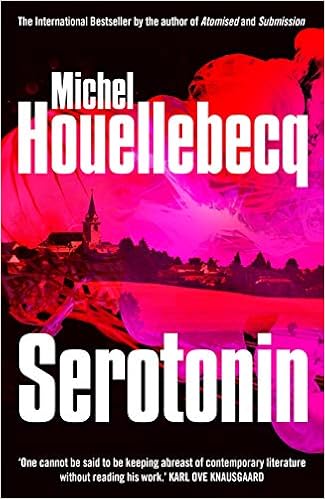 |
| Amazon link |
This is Wikipedia's summary.
"The narrator, Florent-Claude Labrouste, is a depressed agricultural scientist who lives in a Parisian apartment block, the Tour Totem. He commutes to Normandy to help promote French cheese.Reviews were mixed: bourgeois horror from Robert Harris in The Times; other reviews suggested it was a bit boring (as compared to "Submission").
Sympathetic to the plight of local farmers, he is powerless to help them retain their traditional methods:
In short, what is taking place with French agriculture is a vast redundancy plan, but one that is secret and invisible, where people disappear one by one, on their plots of land, without ever being noticed.
After watching a television documentary about people who choose to disappear from their life without telling anyone, Labrouste abruptly leaves his girlfriend, a young Japanese woman who is sexually hyperactive but devoid of affection, quits his job under a false pretence and flees to a chain hotel in another part of Paris. A doctor prescribes him an antidepressant to remedy his low levels of serotonin, hence the title of the novel. Although the drug dulls his sex drive, Labrouste returns to Normandy in search of former lovers. While there, he visits an old college friend, Aymeric, a divorced and suicidal aristocratic landowner.
At the climax of the novel, farmers equipped with assault rifles blockade a motorway. Aymeric is among them and shoots himself, sparking a clash with riot police in which 10 more people die.
Later on, for a couple of weeks, Labrouste secretly observes the love of his life, Camille, who has a son from another man. Initially intent on killing the child with one of Aymeric's sniper rifles in order to win back her love, he finds himself unable to go through with it.
Finally, Labrouste moves back to Paris, contemplating suicide by jumping out of a window."
Very superficial, these reviews.
Houellebecq gives voice to the modern petite-bourgeoisie. This vastly-expanded social stratum, left behind by the ascendant neoliberal elite (the 0.1%), is increasingly precarious, alienated and desperate. The Idealists amongst them, the Myers-Briggs NFs, increasingly assemble themselves around displacement activities: fads such as veganism, climate change, plastic waste. Meanwhile, the Rationals, the NTs, have become skeptical and nihilistic - seeing no way out.
Houellebecq speaks for the latter group.
In Houellebecq's previous novel, "Submission", his protagonist cynically converts to Islam and gets the material rewards of a remunerative position in the newly-Islamicised Parisian university sector .. and the sexual benefits of four provided nubile wives.
"Serotonin" is darker: the ministry bureaucrat has no way out except death itself. Houellebecq follows his spiritual guide, Albert Camus, to the end.
Just because the author does not see an end to the decay of neoliberalism, as here instantiated in the EU project, does not mean that there isn't one. While the Macron regime has no solutions to the excluded (most visibly the gilets jaunes), in the UK the Boris Johnson - Dominic Cummings axis is actively seeking a rebasing of post-neoliberal capitalism aimed at recapturing inclusivity.
It's not hard to see the outlines of such a solution: transfer payments for regional infrastructure, directed investments in areas which can mop up surplus (and over-educated) professionals, a non-faked sense of national purpose. It's the will to move in that direction which is so fiercely contested... under so many fake banners.
No comments:
Post a Comment
Comments are moderated. Keep it polite and no gratuitous links to your business website - we're not a billboard here.